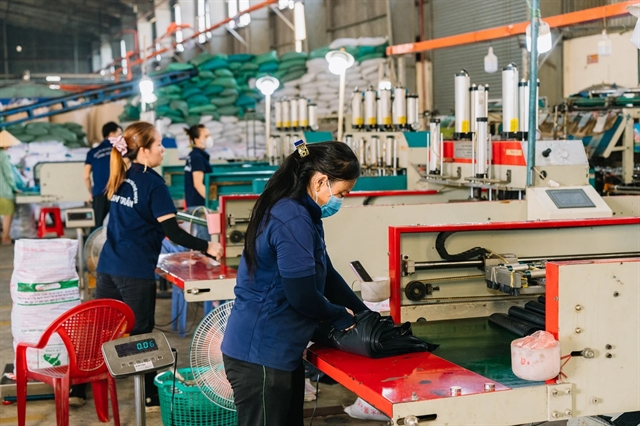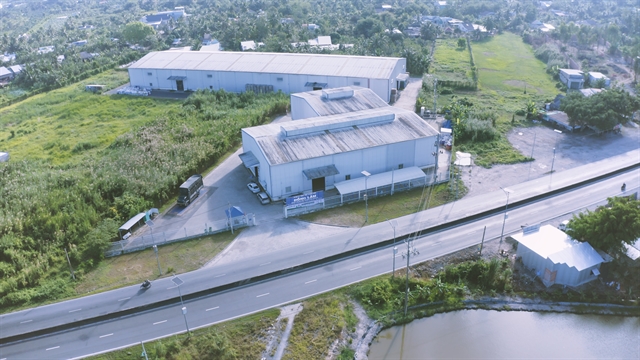It is a crucial time for rubber and plastics industries to pivot toward a greener, more circular and accountable model of growth.

The adoption of Extended Producer Responsibility (EPR) regulations marks a pivotal move toward fostering sustainable development in the rubber and plastics industries, experts have said.
The rubber and plastics industries are among the fastest-growing sectors in Việt Nam, playing a vital role in the nation's economic development.
The plastics industry generates approximately US$25 billion in annual revenue, maintaining an average growth rate of 10-12 per cent.
Meanwhile, the rubber sector has firmly established its presence on the global export map, achieving an annual export turnover of around $3.5 billion. This strong performance positions Việt Nam as one of the world's leading rubber exporters.
According to the Chairman of the Vietnam Waste Recycling Association, Trần Việt Anh, the plastics and rubber sectors have made significant contribution to the national GDP. However, now is a crucial time for the industries to move toward a greener, more circular and accountable model of growth.
During a recent workshop in HCM City, Việt Anh said his association was actively promoting plastic and rubber waste collection and recycling through circular economic models.
EPR stands as a key pillar in this transformation, compelling businesses to take full responsibility for the entire product lifecycle, from production and consumption to collection and recycling, according to Anh.
While EPR promises to curb environmental degradation, it also presents growth opportunities for Việt Nam’s nascent recycling industry.
Currently, only a few domestic firms - just two in the plastics sector - meet international recycling standards. Most others continue to produce low-quality recycled products that fall short of the stringent requirements in export markets like the EU and the US.
In developed economies, recycled materials must reach at least 90 per cent of the quality of virgin products, a benchmark Việt Nam is still working to achieve.
Beyond legal compliance, effective EPR implementation creates constructive pressure for producers to adopt more sustainable and globally competitive manufacturing practices.
Lê Anh, Sustainability Development director of DUYTAN Recycling, said that the company currently collected around 12 million plastic bottles daily, equivalent to about 180 tonnes of plastic waste, to recycle products that meet export standards. Notably, 60 per cent of these products were exported to high-demand markets in Europe and the US.
Lê Anh described EPR as a passport for businesses to access large markets that are becoming increasingly stringent on environmental requirements.
One standout initiative is the 'Plastic Collection & Recycling' project, launched in partnership between DUYTAN Recycling and Unilever Vietnam in 2022. After two years of work, the project has collected and recycled more than 15,000 tonnes of plastic waste. It aims to double that figure to 30,000 tonnes by 2027.

However, experts warn that while EPR holds great promise for greening rubber and plastics sectors, its implementation continues to face significant obstacles.
A lecturer from the University of Natural Resources and Environment highlighted that global plastic production skyrocketed from just two million tonnes in 1950 to over 400 million tonnes by 2019, yet only about nine per cent was recycled. Việt Nam mirrored this trend, with plastic consumption rising sharply from 0.2 million tonnes in 1990 to more than 10 million tonnes in 2022. That figure was projected to reach nearly 12 million tonnes by 2025.
Despite this surge, recycling remains limited.
In major cities like Hồ Chí Minh and Hà Nội, an estimated 80 tonnes of plastic bottles and bags are thrown away daily. However, only around 10 per cent of that waste is recycled, with most of it ending up in landfills or incinerators, leading to wasted resources and worsening environmental pollution.
Experts point to multiple barriers hindering progress. Recycling household waste is a complex and costly process that requires significant land, advanced technology and capital investment. Moreover, it produces secondary waste that also needs to be treated.
Policy limitations are another concern. Currently, the Government support for recycling enterprises is seen as insufficient to attract new investors or foster innovation in the sector.
To accelerate the effective implementation of EPR in Việt Nam, Phạm Việt Anh, PhD, a sustainable business management expert, called for more targeted government support and long-term strategic planning.
He suggested that the State introduce specific incentives such as preferential electricity rates for waste-to-energy projects, the establishment of dedicated recycling industrial clusters and financial reward mechanisms for businesses that effectively implement EPR practices.
He also stressed the urgent need to invest in the workforce's know-how, particularly in engineering and environmental technologies. VNS





